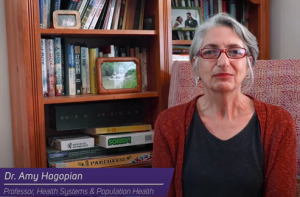I started my public health career more than 40 years ago. My beloved profession has expanded its views on what exactly *IS* public health since then. We got hip to the environment, the importance of nutrition, how the tobacco industry is killing us, and that cars should be safer. Some really heroic figures have moved our profession, people who tackled working conditions, who studied the role of stress in health—including the stress of racism and repression–and who got sex and sexuality out of the closet. Others have challenged the role of capitalism and big corporations in making too many health-related economic and political decisions.
But our profession is still a little clueless about one of the most obvious things that causes humans a lot of pain and agony: War, armed conflict and militarism. See video:
Public health is about upstream work—the causes of the causes. But for too long our profession has treated war like it was wallpaper—it’s what’s going on in the background while we’re busy working on the downstream effects.
Local and state health officials have failed to connect the dots between war and the opioid epidemic or suicide or intimate partner violence.* Even violent policing has roots in war and militarism. Training people to kill requires the concept of the other—that’s what racism is for.
Why don’t we do a better job noticing the connections between war and the ways in which it plays havoc with the health of all of us, not just those who come back from Iraq or Afghanistan in a body bag?
The powerful forces who profit from war work hard to make sure we’re not looking at them. This is a deliberately marginalized part of public health, with no NIH research dollars, very few journals or conferences aimed at it, a tiny number of textbooks and courses in our schools of public health—in short, all the markers of prestige in our profession point away from any serious examination of war as a huge lurking threat to all of our health, even for those not on the battlefield or living in a refugee camp.
My call to action is really simple and really hard. Public health people have to start noticing war and its twin evil, militarism. We’ve gotta connect these causes to the problems we’re all working on. How has exposure to war violence, the forced migration of populations, and the diversion of resources, harmed health in our own communities? Notice it, talk about it, work on it.
By: Amy Hagopian
